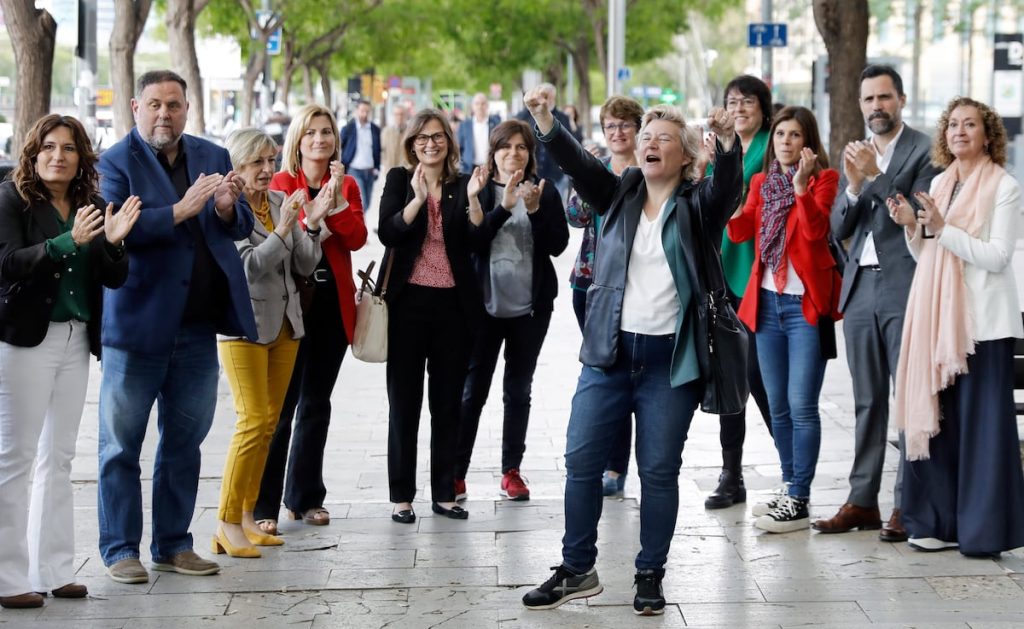The first statements of the accused in the Tsunàmic Democràtic case have been very lackluster. Out of the ten people being investigated by the National Court for terrorism in the riots that occurred in Catalonia in 2019, only Marta Molina, secretary of Social Movements in ERC, appeared on Wednesday to testify via video conference before the investigating judge, Manuel García-Castellón. Three of the accused had already managed to postpone their summonses—including the general secretary of ERC, Marta Rovira, and Josep Lluís Alay, a friend of former President Carles Puigdemont and head of his office in Waterloo, Belgium—and the rest, some of whom had left the country when they were accused, did not show up in court despite the judge’s requests. The parties are now waiting to see what the next steps of the judge will be, and some accusers are considering requesting a search and arrest warrant for those who were supposed to appear on Wednesday but did not. Last week, a day after the Catalan elections on May 12, García-Castellón summoned the ten accused individuals in the National Court (there are two others accused in the Supreme Court for the same case) to testify on May 22. Nine of them were ordered to testify via video conference from Barcelona: Marta Rovira, Josep Lluís Alay, Marta Molina, businessmen Oriol Soler and Josep Campmajó, Xavier Vendrell, former government advisor and former ERC leader, journalist Jesús Rodríguez, Oleguer Serra, a member of the board of Òmnium, and Jaume Cabani, considered the treasurer of Tsunami. For the tenth individual, Italian banker Nicola Flavio Giulio Foglia, an international cooperation order was issued to interrogate him in Italy, although he is said to be in Switzerland. However, the activation of all these summonses triggered a wave of appeals from the accused, who tried to postpone all the statements. The judge only agreed to indefinitely suspend three statements—those of Rovira, Alay, and Soler—after their lawyers claimed they had prior professional commitments or medical problems. The rest of the interrogations, therefore, remained valid.
Only Molina appeared on Wednesday to testify—albeit remotely, via video conference from Barcelona—before the judge. During a brief appearance in which she only responded to her lawyer’s questions, she reiterated that she had never supported violent actions and that she was not involved in the organization of Tsunami, the platform that encouraged protests against the sentence issued in 2019 by the Supreme Court against the leaders of the independence movement that had not fled. According to several legal sources present at the hearing, Molina added that she learned about Tsunami’s existence through the media and that it was a pacifist movement. “Marta exercised her right not to answer any questions, neither from the judge nor from the accusers. She only answered her defense’s questions. And we simply contextualized the peaceful framework in which the protests called by Tsunami Democràtic took place. Marta stated that all the messages sent by Tsunami, which she saw through the media, were calls for non-violence, civil disobedience, and peaceful mobilization of citizens. She argued that it was not a violent movement, much less a terrorist one,” explained Marina Roig, Molina’s lawyer, after her testimony. On Tuesday, during a press conference, Marta Molina had stated: “I am aware that I could go to prison […] I accept it, but the State will have to face the consequences of having political prisoners in prison again.” However, no party has requested precautionary measures against her after her testimony, according to legal sources. Now it remains to be seen what will happen with the other five accused individuals who were supposed to testify before the judge on Wednesday: Xavier Vendrell, Jaume Cabani, Oleguer Serra, Jesús Rodríguez, and Josep Campmajó. The latter three have moved to Switzerland to live, and in an interview with EL PAÍS, they already hinted that they would ignore García-Castellón’s summons.


